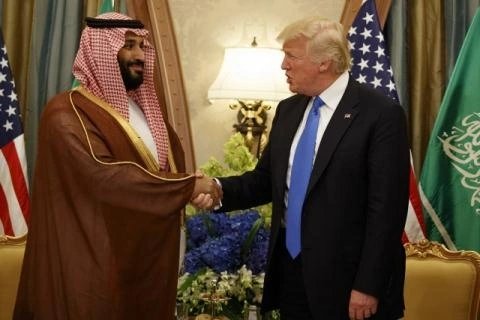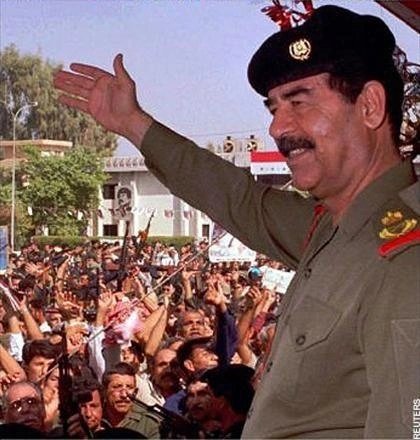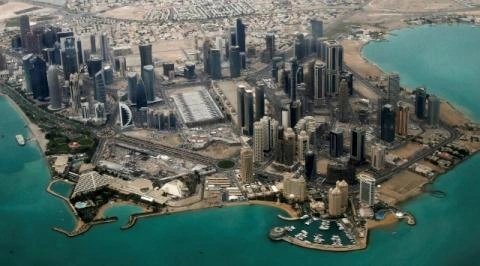What happened to Saddam Hussein in the Iran-Iraq war shows that the American trap is always very dangerous for partners and allies…
The Qatar diplomatic crisis is still hot and will continue to be hot.
However, the destination that Riyadh’s arrow is aiming at is Tehran – Riyadh’s biggest enemy, and the Middle Eastern state is actually just a mobile chess piece.
Analysts believe that Riyadh could be in danger if it decides to increase its counterweight to Tehran, and the consequences Saddam Hussein’s government suffered in the Iran-Iraq war from 1980 to 1988 are an unfortunate lesson.
The crisis surrounding the mobile chess piece Qatar is putting Saudi Arabia in a dangerous position
The country is exhausted because of the dream of Hegemony in the Middle East
After the Islamic Revolution in Iran in 1979, the conflict between unified Islamic ideology – Shi’ite, represented by Iran, and Arab national Islamic ideology – Sunni, represented by Saddam’s Iraq.
The conflict between Shi’ite Islam and Sunni Islam in the Middle East has become the center of conflict in the Muslim world.
With the desire to elevate Iraq to the level of a regional power, President Saddam Hussein turned the ideological conflict into an armed conflict by attacking Iran, thereby increasing Iraq’s oil reserves – an important condition.
On September 22, 1980, Iraq invaded Iran, starting the longest conventional war of the 20th century. It was not until August 20, 1988 that this war ended.
The Iran-Iraq war has fundamentally changed the political landscape in the Middle East
The consequence of this `fratricide` is huge economic and financial losses for both sides, estimated at about 1,200 billion USD.
Iraq had to shoulder an international debt of up to 130 billion USD, causing the country’s post-war GDP growth to be too slow.
Saddam Hussein’s `recklessness` was punished when the 34-nation coalition carried out Operation Desert Storm, liberating Kuwait in February 1991, putting Iraq in even more dire straits with war compensation.
That reality makes Saddam Hussein’s Iraq no longer a counterweight to Iran, before being overthrown by the US in 2003. Saudi Arabia – another ally of Iraq in the war with Iran – is said to have taken over the role.
Even though the nature of the Saudi Arabia – Iran conflict is different from the nature of the Iraq – Iran conflict, the essence is still the same, which is the competition for the throne of `Hegemony in the Middle East` and the hope of becoming

Oil wells are no longer a tool to help Riyadh realize its dream of hegemony in the Middle East
The Saudi Arabia – Iran conflict did not lead to a direct war, but instead shifted to a form of competition for influence in the region through `making partners and forming allies`.
As a result, the Saudi Arabian government’s spending between 2003 and 2015 increased fourfold, pushing the breakeven price of crude oil – the price at which the Royal government balances its budget – to more than 100 USD/barrel.
When oil prices were high, everything was not a problem, but when the price of raw mulberries dropped to a record low, the cost of `joining boats` became a resonance for Saudi Arabia’s budget deficit.
Also in 2015 and 2016, the Saudi Arabian government spent about 100 billion USD out of 650 billion USD of the national reserve fund.
The IMF even had to make a dangerous prediction that Saudi Arabia could run out of money within the next four years.
Analysts say that if Riyadh does not temporarily give up its dream of hegemony, the lessons of Saddam Hussein’s government in the Iran-Iraq war may be repeated to Saudi Arabia.
But Riyadh initiated the Qatar crisis, showing that it seemed ready to accept that danger.
Always sucking the bitter fruit of America because of its ambition to dominate the Middle East
During the Iran-Iraq war, Saddam Hussein’s government received support from the West, especially the United States, because Iraq created an important counterweight to the post-revolutionary Iranian state.

Saddam’s bitter fruit is a warning to Saudi Arabia
`President Jimmy Carter reportedly gave Saddam Hussein the green light to wage a war against Iran and informed him that Washington supported Baghdad in its war with Tehran,` according to History.
This shows that the US has tilted towards Saddam’s Iraq, but Baghdad cannot prevail over Tehran in its isolated state.
That suspicious situation was explained by former Secretary of State Henry Kissinger to mean that Washington did not completely stand beside Baghdad as they pledged.
A bitter fruit for Saddam Hussein.
Currently, Riyadh is being given an advantage by Washington over Tehran.
Most recently on June 14, US Secretary of State Tillerson stated that US policy, in addition to preventing Iran from developing nuclear weapons, also aims to support elements within Iran to lead a peaceful transition.
Militarily, Saudi Arabia is an important ally of the US in the Middle East, so support is always important.
During the contest in Yemen between Saudi Arabia and the Yemeni government with the Iran-backed Houthi guerrillas, US warships are always on duty off the coast of Yemen to support allies.

Saddam Hussein, because he believed America’s promise, left Iraq devastated
However, it seems that the advantages created by Washington still cannot help Riyadh create an advantage over Tehran.
Observers have not noticed anything unusual, but public opinion has begun to be skeptical about Washington’s support for Riyadh – either it is not substantive, or it is restraining its ally.
It should also be recalled that, under President Obama’s administration, which placed a heavy emphasis on political interests, even though Washington – Tehran relations were still in a sensitive period, a deal between Boeing Corporation and Tehran was worth
If on July 8, 2016, the US House of Representatives did not approve the blocking measure, the largest trade between the US and Iran since the Iranian Islamic Revolution in 1979 would have been carried out.
While the current Trump administration values economic interests, it is entirely possible that Riyadh will be considered by Washington to be in an offside position towards Tehran, given Washington’s gentle attitude towards `Qatar terrorist accomplices`.
It can be seen that what happened to Saddam Hussein’s government during the Iran-Iraq war was related to Washington’s pledge of support, which was seen as a warning to Riyadh in the Saudi Arabia-Iran conflict.
In international diplomatic relations, it seems that Americans always prepare bitter fruits to give to their allies and partners.
According to Ngoc Viet
Dat Viet Newspaper


